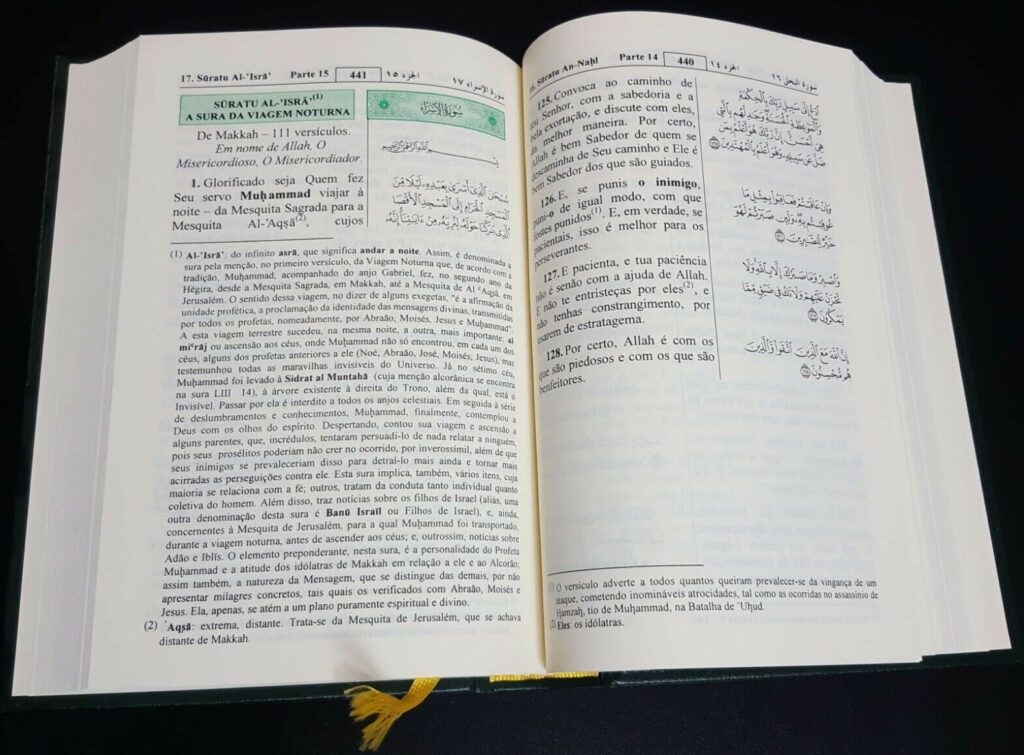The history of this translation of the Qur’an into Portuguese, printed by the King Fahd Qur’an Printing Complex (KFQPC) in 1425/2004 and widely distributed all over Brazil, has its roots in the mid 1980s. In 1984, the Muslim World League contracted a scholar of Arabic called Helmi Nasr (1922–2019) to translate the Qur’an into Portuguese. Nasr is a particularly interesting character: not a native speaker of Portuguese, he was born in Egypt, where he pursued an education in Arabic and, later, French, after which he moved to San Paolo in Brazil in 1962, with the mission of establishing a chair of Arabic studies at the local university there. For many years he was one of the most active members of the growing Arabic community in Latin America, and had close ties with the Muslim World League. After starting work on his translation in 1984, Helmi Nasr completed it some four years later, in 1988. According to his own report, the translation was never published by the MWL because of the lack of an appropriate committee to review the translation: quite simply, no one had the required linguistic skills in Arabic and Portuguese combined with a basic knowledge of the Qur’an and Islam. Only in the early 2000s, when the file was transferred to the KFQPC, did the project finally come to fruition. Usually promoted as new Muslim-authored interpretation of the Qur’an into Portuguese, Nobre Alcorão appeared as a translation with parallel Arabic text in a standard KFQPC print edition. After his work was published, Helmi Nasr spent a lot of time travelling all over Brazil to present his work in local Islamic centers, and the opportunity for readers to encounter the translator in person greatly influenced the popularity of the text.

Nasr’s translation contains a great deal of commentary, especially when it comes to the first few suras, and this is oriented towards both Muslim and non-Muslim audiences. The language used is described by some reviewers as Brazilian Portuguese (português brasileiro) which differs from that spoken in Portugal in both phonology and prosody. In addition, Nasr makes recourse to some specifically Brazilian domestic sources to provide some of his religious vocabulary. For example, when explaining his translation of the bismillah formula, he compares different terms to phrases used in Christian sermons in the local form of Portuguese. Overall, the translation does not include many Arabisms, and this makes it easily accessible for a non-Muslim audience. Nasr often makes use of Christian vocabulary: for example, in the commentary provided at the beginning of Q 2, Ibrāhīm is named ‘Patriarca Abraão’ (‘Patriarch Abraham’), which seems to be an exclusively Christian term used to refer to Biblical prophets.

The text is mainly literal in its style of translation, although it does include some insertions, which are emphasized in bold: again a stylistic device which can be found in many Bible translations. Nasr also provides quite long introductions to the suras, located in footnotes, mostly covering the history of the events mentioned in the text. Generally, there is no direct reference to any specialist tafsīr literature, but it does seem that the translator did consult tafsīr works. For example, Q 8:5 reads as follows:
‘[A situação de desagrado, acerca da distribuição de espólios], é como [aquela havida, quando] teu Senhor, em nome da verdade, te fez sair de tua casa [para combateres], enquanto um grupo de crentes, o estava odiando’.
In English, this would be:
‘[The situation of displeasure, concerning the distribution of spoils], is like [that which took place], when your Lord, in the name of truth, made you go out of your house [to fight], while a group of believers were hating this.’

The additions to the text, presented here in brackets (originally, in bold script), are no more than insertions from exegetical sources, without which the literal meaning of the Qur’anic text would be not clear to the reader. Even in the most literal translations of this verse (such as Yusuf Ali’s rendition ‘Just as thy Lord ordered thee out of thy house in truth, even though a party among the Believers disliked it’) the translation is still supported by additional commentary. Helmi Nasr also provides a few footnotes for this verse. His choice to indicate insertions by using bold text (rather than brackets, as is the format in almost all other KFQPC editions) has clearly posed some challenges to later editors. For example, the 2020 edition of this work published in Brazil (which contains no Arabic text or commentary) presents all the text in the same format, so it is completely impossible to detach the actual translation from Nasr’s explanatory interventions. There are a couple of other Muslim translations into Portuguese available (like the one by Samir El Hayek, 1975), but it still seems that Nasr’s work remains the most popular source of reference for Muslims living in Brazil (a minority constituting an uncertain number somewhere between 20,000 and 200,000 people out of a total population of some 214 million people), as well as for domestically produced academic studies on Islam.
Mykhaylo Yakubovych
